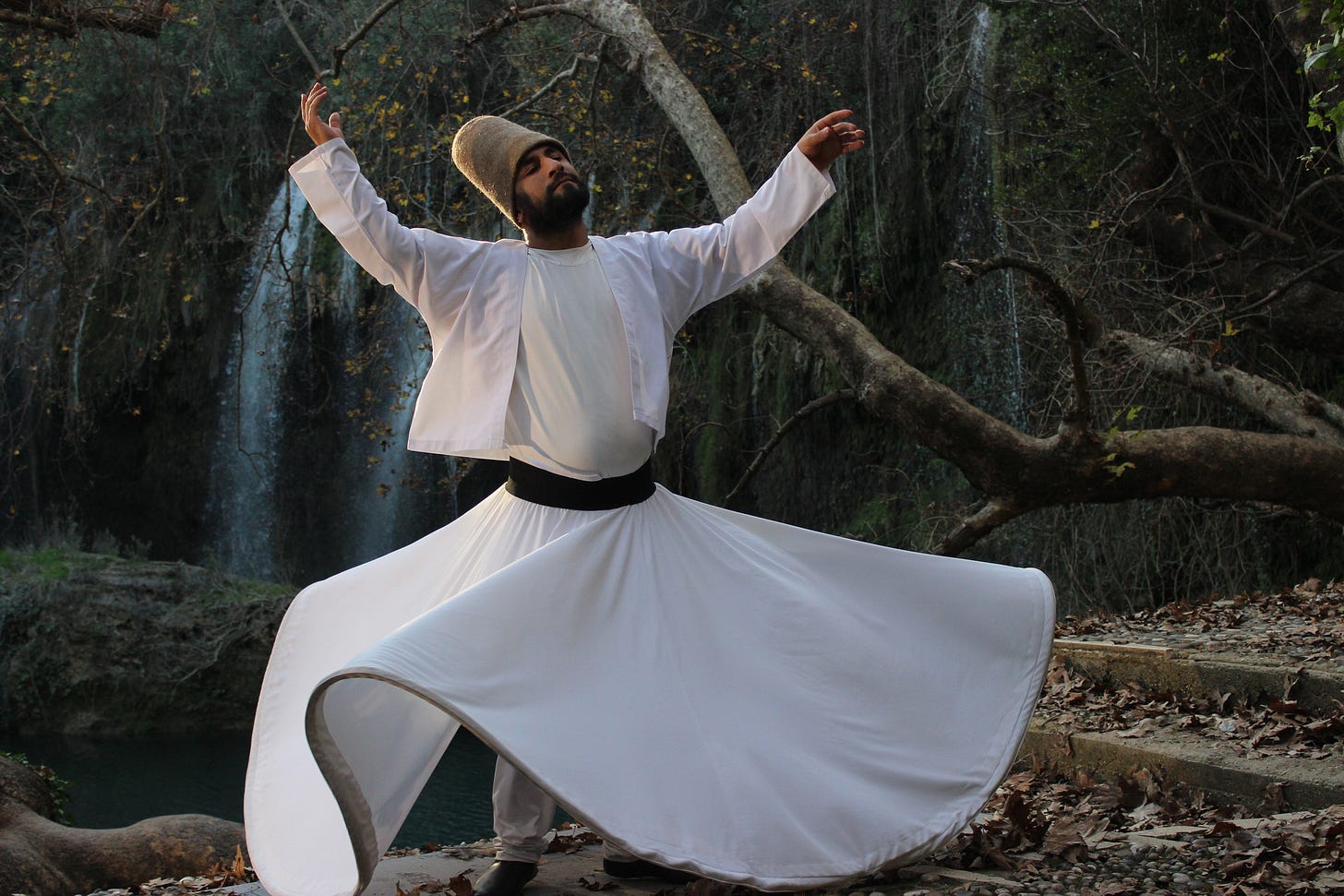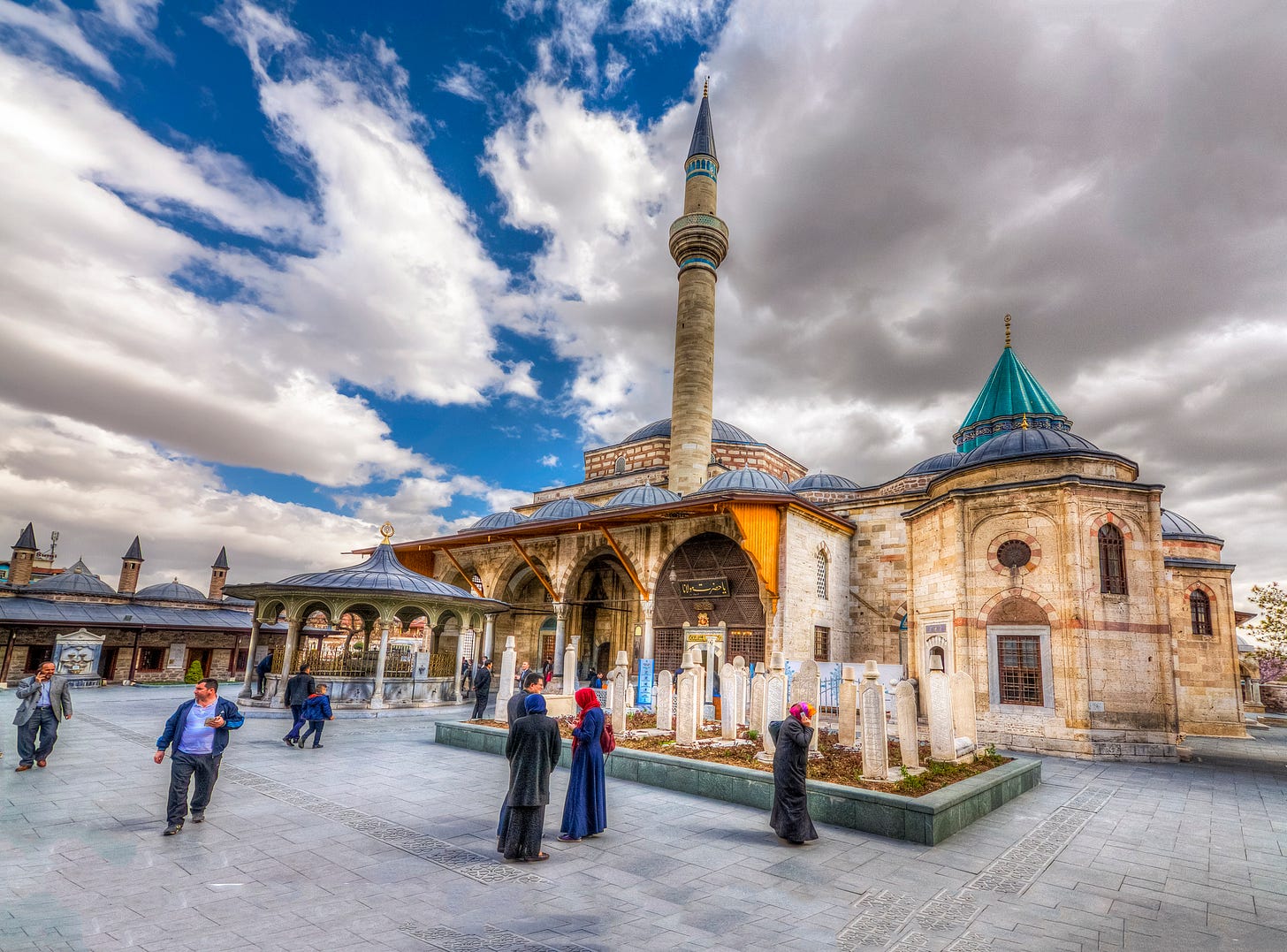The Luminous Essence of What We Truly Are
Reflections on the spiritual journey of Rumi.
What a difference between a heart that breaks and a heart that breaks open.
– Shams of Tabriz, teacher of Rumi
Here’s the new rule: break the wineglass,
and fall toward the glassblower’s breath.
Inside this new love, die.
Your way begins on the other side.
Become the sky.
Take an axe to the prison wall.
Escape.
Walk out like someone suddenly born into color.
Do it now
– Rumi
Jalāl ad-Dīn Muhammad Balkhī Rumi, born September 30, 1207, is one of the most revered and beloved poets of all time. Search for inspirational quotes and you are bound to find something of his. Attend any type of spiritual class and you are sure to hear his profound poetry. We have a love affair with Rumi. This is due to the fact that Rumi had a love affair with the divine, and such a love cannot be ignored once it is experienced. It flows to us through him. That love is like gravity. An invisible force that is so strong it has shaped the universe and created all things. When we come into the vicinity of its gravitational field we can’t help but be sent into its orbit, feeling it molding and shaping us into a new form.
Rumi was born to Persian parents in what is currently Afghanistan. His father was a learned and respected scholar of Islam. Rumi himself was so exceptional that the torch was passed to him and he also became a revered teacher and theological leader. But at some point Rumi broke away from tradition, having found out what the mystics of all religions ultimately find out, that the only place to discover the divine is within one's own heart. How did such a man evolve from a heady religious scholar and theologian, steeped in the structured world of Islam in the 12th century, into a mystic, poet, and spiritual master, who jettisoned religious authority and ritual?
Direct Experience
We begin to understand this when we start to see how, for mystics, a deep religious understanding does not come through doctrine and rational thought, rather it comes only through direct experience. Rumi tried to obtain it through the normal route. He was suffused in theology and rationally grasped at the notion of God, but to no avail. Instead, we find him declaring, “Far-sighted reason – I have tested it. Henceforth I’ll make myself demented.” (Masnavi 1: 3278).
The doctrinal study, the deep scholarly immersion, and the intellectual understanding of the words of the Koran were meaningful and important as a stepping stone for Rumi, but he came to understand that there was something still deeply unsatisfying within his being when only the intellect understood. He writes: “The philosopher winds up through doubt and conjecture into denial. Bash your head against the wall!” (Masnavi 2: 2332).
Bashing one's head against the wall may seem a dramatic response to life as a theologian. For someone like me coming from an academic background with a career as a neuroscientist and a Ph.D in philosophy and cognitive science, the last thing I would have previously thought of to do to understand something would be to bash my head against a wall.
But after coming to understand, mainly through reducing the incessant chatter of my thoughts through meditation, that there is far more to this reality than my brain could possibly comprehend, I’m beginning to fully believe that reducing reliance on the intellect (at least within some domains) is key to understanding large swaths of existence. I’ve begun to embrace “brain bashing” as a method to understand true reality, much to the chagrin of my fellow materialist academicians.
When Rumi was 37 years old he was a highly respected member of the Islamic community, following the strictures of his faith as a traditional religious teacher, but then something happened that upended his conventional world. He met a wandering Dervish, the spiritual master Shams of Tabriz, a renegade mystic who some considered to be “riffraff”. When Shams arrived, Rumi was drawn to him as to no other. Shams broke Rumi out of his “dogmatic slumber” to borrow a phrase from Immanuel Kant, who, after reading David Hume’s work on the nature of causality, realized that he had been living within the confines of some major unexamined assumptions.
This also happened to Rumi after meeting Shams. There is a legend that Shams threw all of Rumi’s books into the fire in order for him to release his reliance on the words of others. Waking up out of his own slumber, Rumi may have had what may be referred to as a “direct transmission” of truth from Shams, which opened his heart to the divine, instead of his mind. So he writes, The Sufi’s book’s not writ in words and ink. It is nothing but a heart white as snow. (Masnavi 2:159). The truth, Rumi saw, was to be found in the heart, not the head. Rumi was so attracted to that truth that he couldn’t turn away. He was in the grips of its love and gravity. He was also deeply in the grips of love for Shams, the one who held up the mirror to Rumi’s own true divine nature.
You can’t turn back
One of my favorite spiritual teachers, Adyashanti, said you better be sure that understanding the true nature of reality and yourself is really what you want because once you start on the path to a spiritual awakening you can’t turn back. It’s like you’re in the vicinity of a black hole and find it so fascinating you are completely compelled to get closer to it. At some point, though, you reach the event horizon and that’s it. There's no changing your mind. It will suck you in and no matter what you do you’re gone.
Adya, as he is commonly referred to, and many other spiritual teachers warn you may really want not to go that way. Spiritual awakenings to our true nature tend to leave a lot of things that we once thought were precious and desired to the wayside. Much can be lost, including our prior beliefs, our careers, our relationships, and our reputations. But, they also impress on us, that whatever may be lost through the process was not fully real anyway, so ultimately it is the clear choice for everyone who wants to know truth. Shams was that black hole, and Rumi was engulfed.
Rumi finally found his own link to the divine through Shams, but then tragedy struck. After two years of learning and flourishing under the tutelage of his closest companion, Shams left. There is some indication that Shams left in order for Rumi to have no reliance on anyone but himself. Whatever the reason, Shams's departure from his life left Rumi heartbroken and plunged him into a deep grief. It is said that Rumi, when he suffered this deepest of losses, went into the mosque and began circling around a pillar, his hand grasping its surface, turning and turning, losing himself in another type of orbit.
His followers surrounded him with pen in hand as verse upon verse sprang from Rumi’s lips like something was dictating through him. And for Rumi, something was. God was. The first verses that poured from his grieving soul were “Listen to the story told by the reed, of being separated. ‘Since I was cut from the reedbed, I have made this crying sound. Anyone apart from someone he loves understands what I say. Anyone pulled from a source longs to go back.’ And thus began Rumi’s journey, through over 70,000 verses, to continually reunite with the divine.
It's waves of love that make the heavens turn
Without that love the universe would freeze:
No mineral absorbed by vegetable
No growing thing consumed by animal
No sacrifice of anima for Him
Who inspired Mary with His pregnant breath
Like ice, all of them unmoved, frozen stiff
No vibrant molecules in swarms of motion
Lovers of perfection, every atom
Turns sapling-like to face the sun and grow
Their haste to shed their fleshly form for soul
Sings out an orison of praise to God
Masnavi 5: 3854-9
Longing for a love more permanent
The love that showed up in human form transmuted into longing for a love more permanent. Rumi’s love for Shams opened him to a love that transcends space and time. “Out beyond the ideas of wrongdoing and right-doing, There is a field. I'll meet you there. When the soul lies down in that grass, the world is too full to talk about. Ideas, language, even the phrase 'each other' doesn't make any sense.” Rumi came to know that love is transcendent of any particular physical thing or idea, as that idea can only separate but rather permeates the entire world.
One of the most important things I’ve learned from Rumi (so far, as there is a lifetime’s worth of wisdom to be found in his monumental work) is to see even the deepest of griefs as a gift, an opportunity to remove another layer of doubt and fear off of us, and to chisel away the remaining shield until all that’s left is the luminous essence of what we truly are. Until you go through it and come out the other side, it’s hard to understand how experiencing the depths of difficult emotions can release you from what is holding you back, but it can.
Rumi allowed his grief to transmute, alchemically, into some of the deepest wisdom and most beautiful poetry the world has ever encountered. There is a lesson there for all of us. I’ll finish with the first poem I’d ever heard of Rumi’s. It was read during Mindfulness Based Stress Reduction, the class that taught me to meditate. In the English-speaking world, it is referred to as “The Guest House”. When I first heard it during that class, I experienced a mixture of mild skeptical curiosity and hope. And now ten years later, I both feel and know the truth of these words:
This being human is a guest house.
Every morning a new arrival.
A joy, a depression, a meanness,
Some momentary awareness comes
As an unexpected visitor.
Welcome and entertain them all!
Even if they're a crowd of sorrows,
Who violently sweep your house
Empty of its furniture,
Still, treat each guest honorably.
He may be clearing you out
For some new delight.
The dark thought, the shame, the malice,
Meet them at the door laughing,
And invite them in.
Be grateful for whoever comes,
Because each has been set As a guide from beyond.







Thank you dear Rabbi for reminding me that each experience is an opportunity for spiritual growth--even grief. Today I was heartbroken by someone whom I thought was a friend but turned out to be a deceitful liar. And yet, I stand with my values and spirit sad but very intact. And somehow I have to trust in G-d that the lesson of today will eventually be unfolded for my understanding.
One of your absolute best!
Speaking of “bashing your head against the wall,” I just the other day read of the legend that upon meeting his teacher, Shams Tabrizi, the entire load of scholarly books that Rumi was carrying burst into flames!
And speaking of a lifetime of wisdom in Rumi’s writings, here’s one that is worth more in terms of understanding the philosophy of science than any 50 living philosophers:
“In a sense, the entire Koran is teaching nothing, from beginning to end, but abandonment of belief in phenomenal causation.”
(Or to put it in much more simple, religious language, “All is done through the Will of Allah.”)